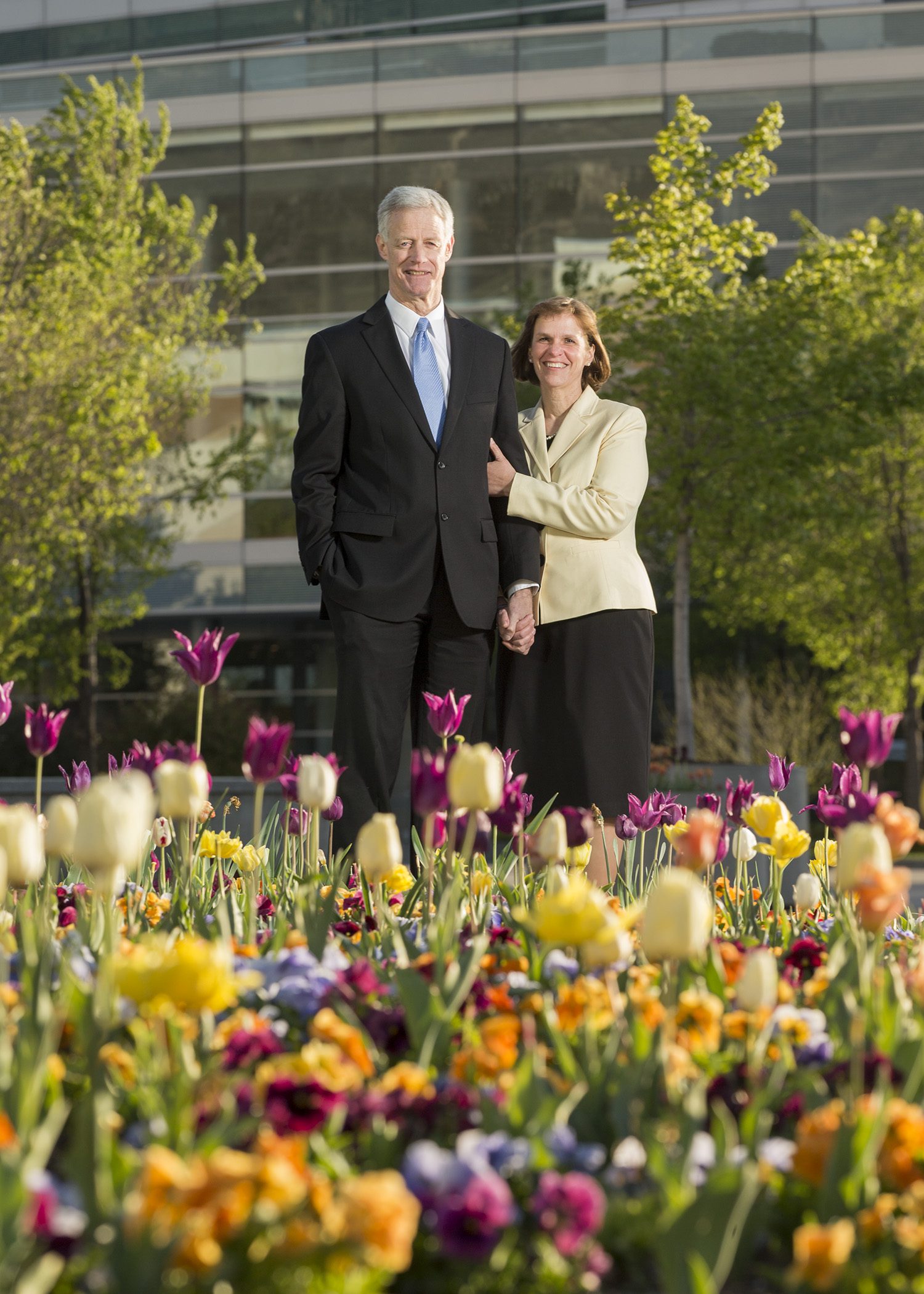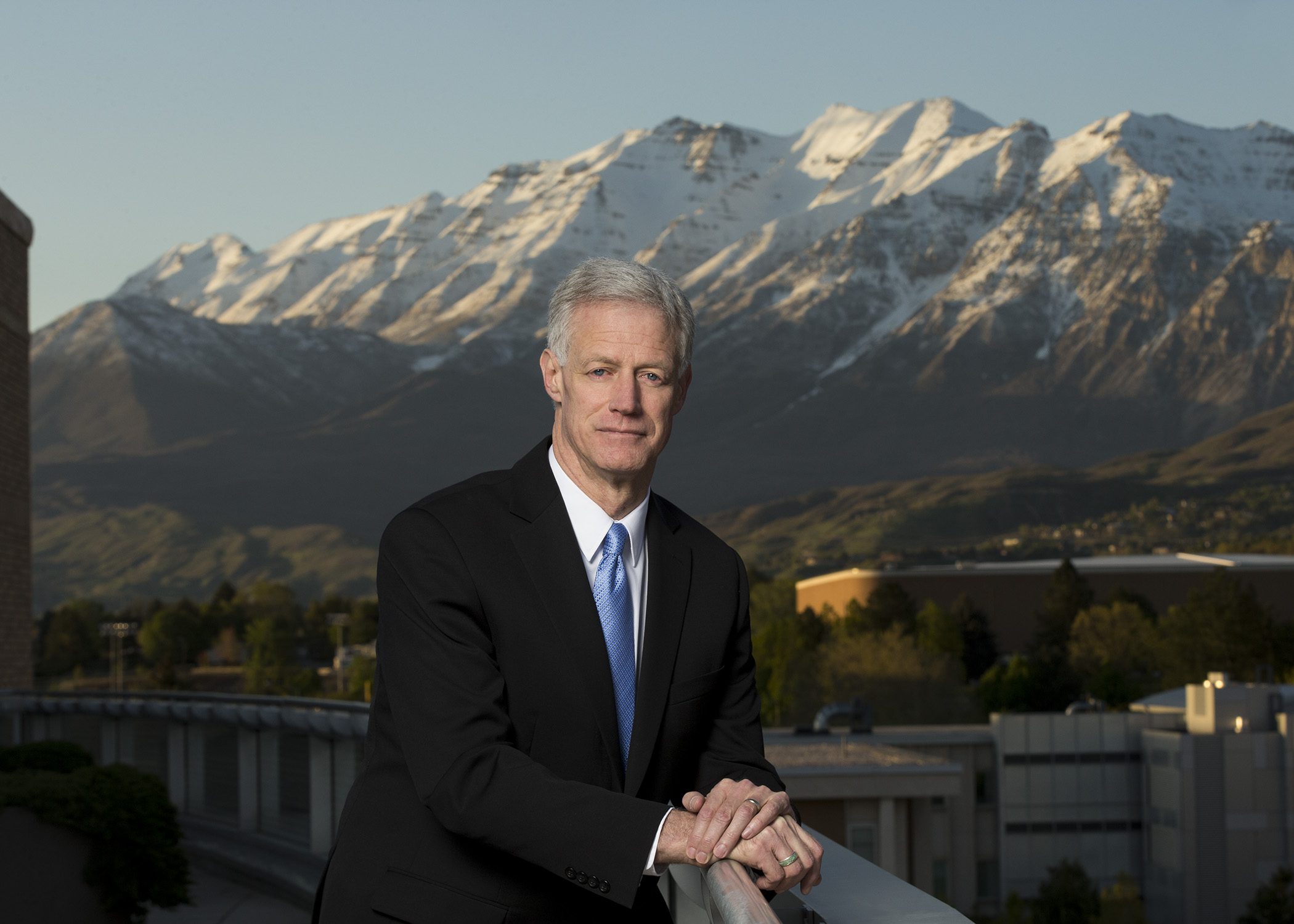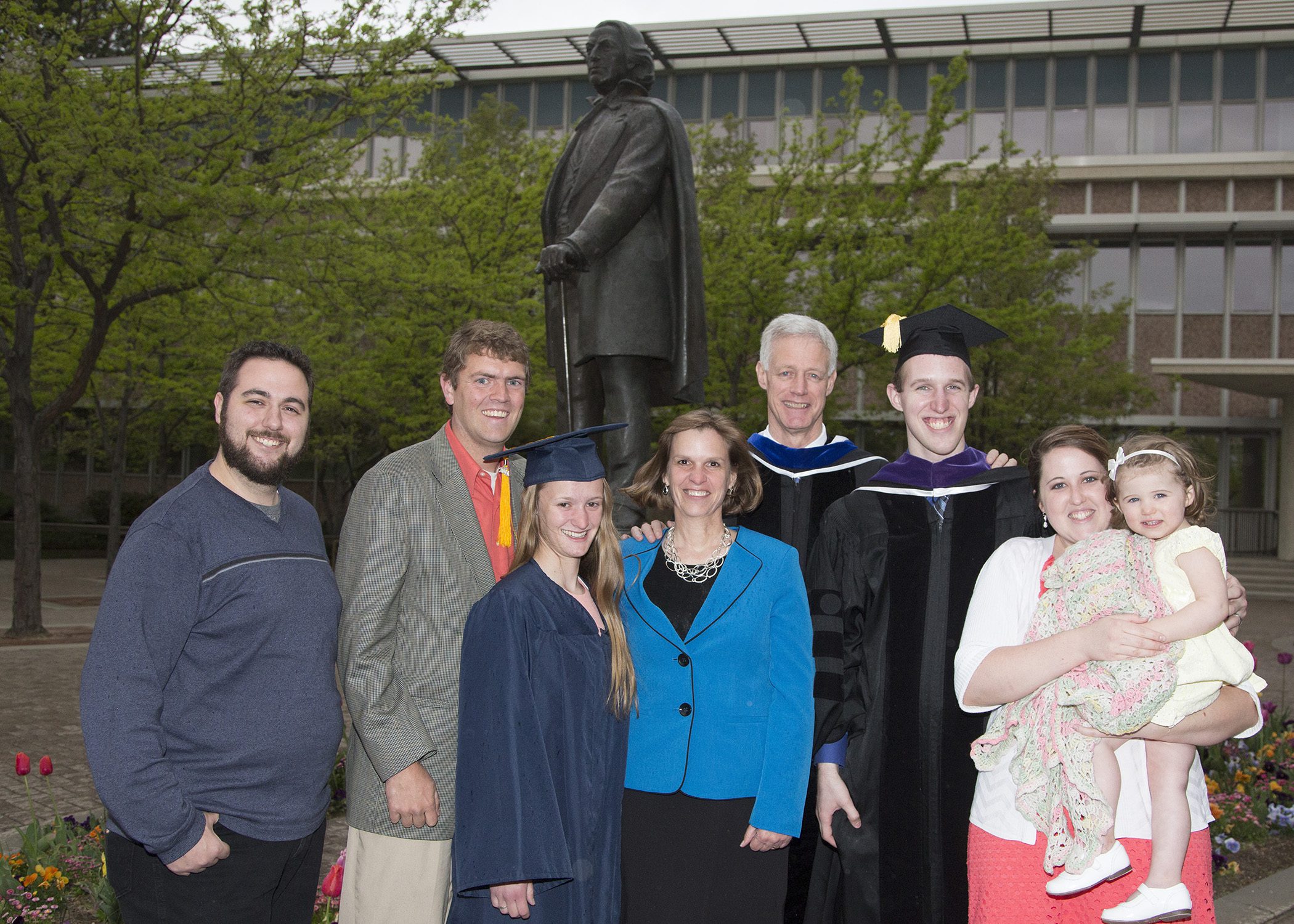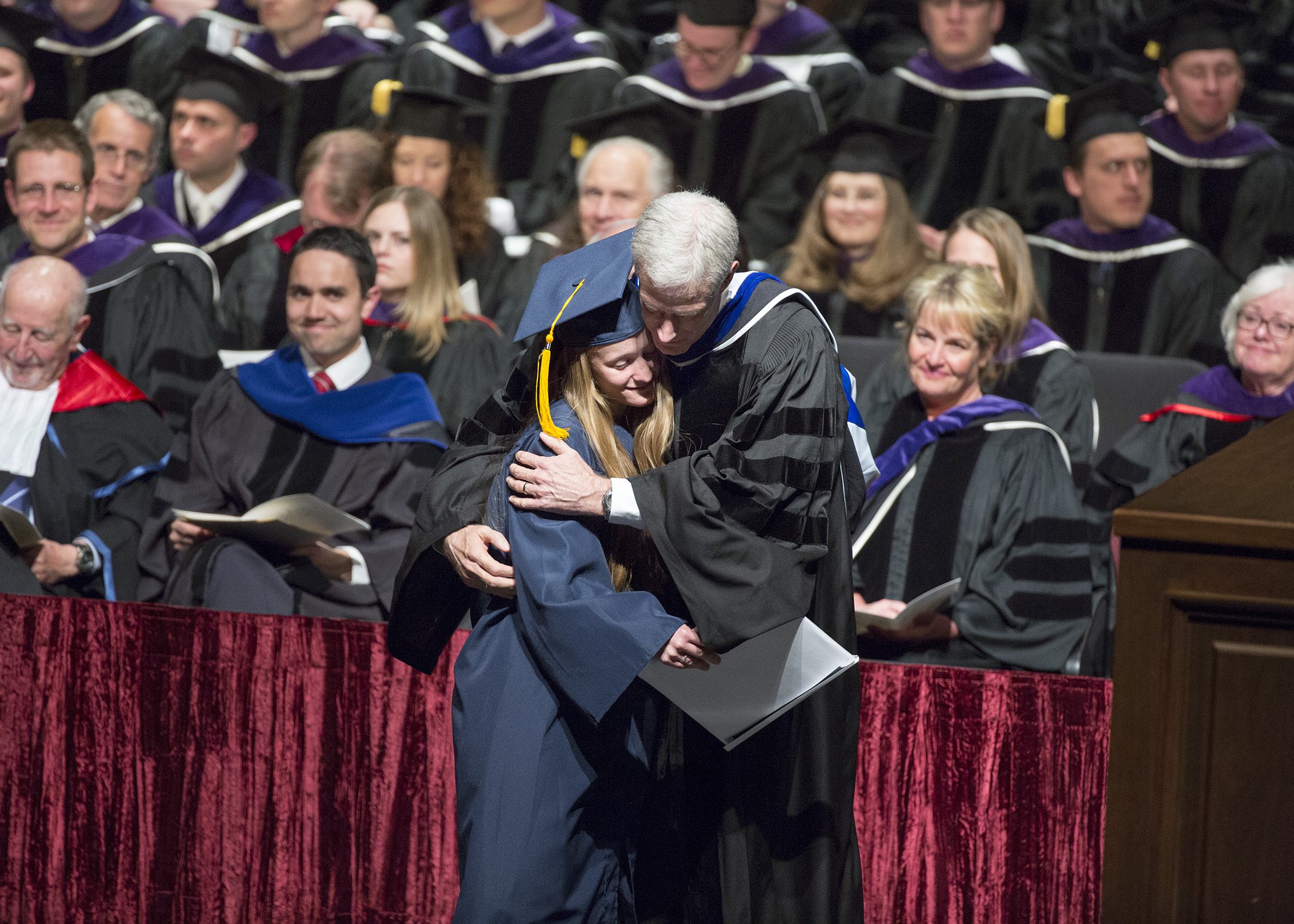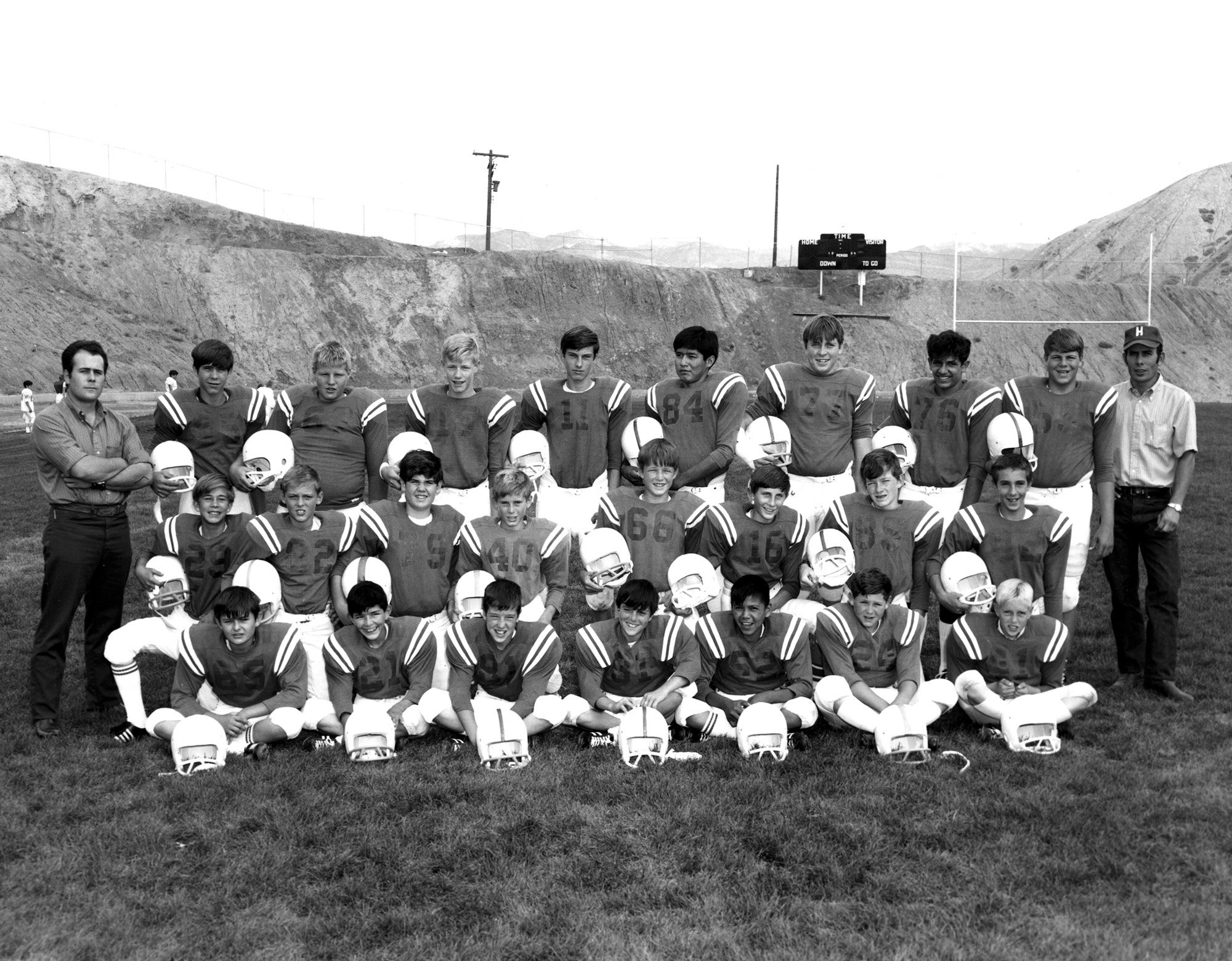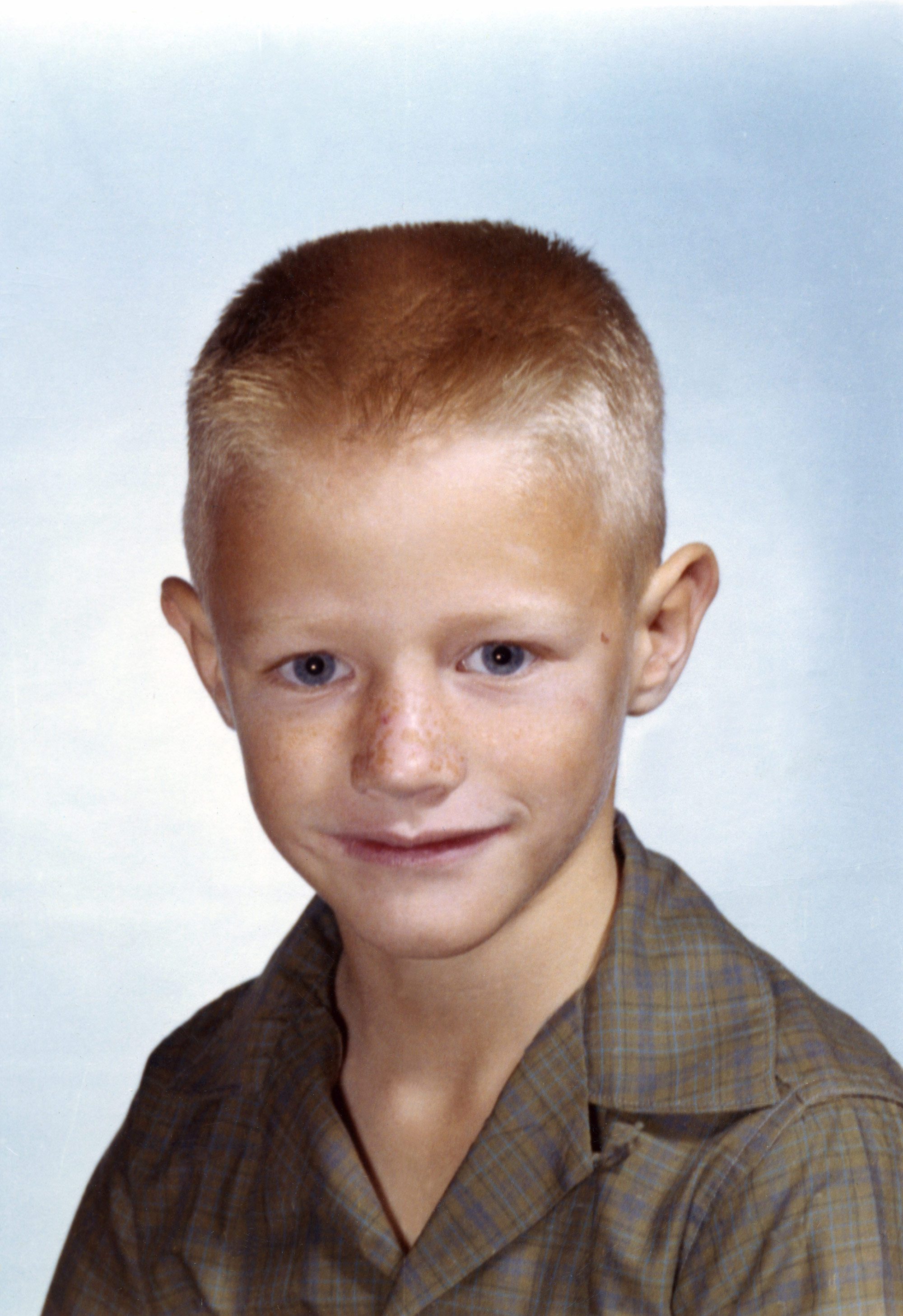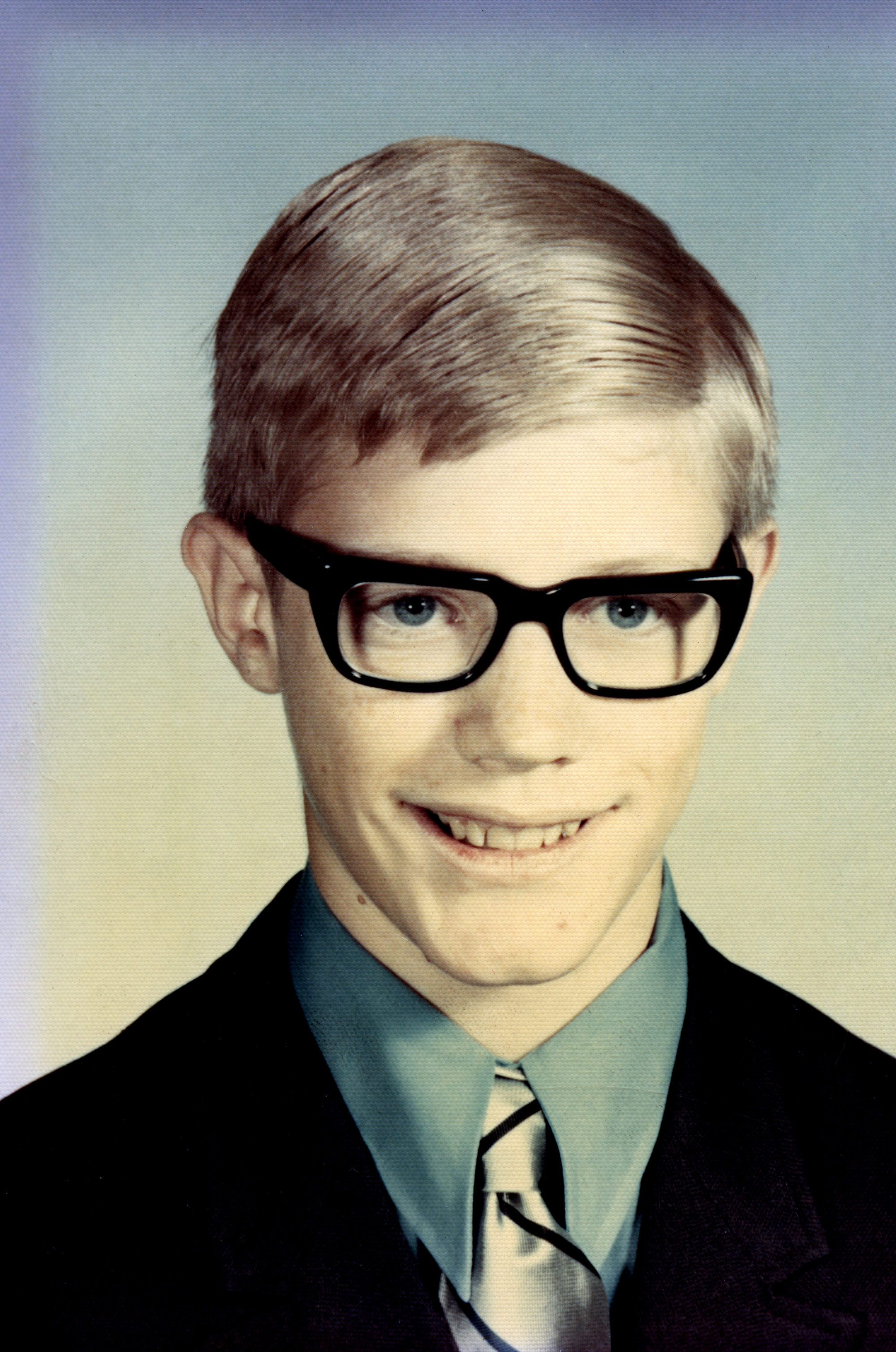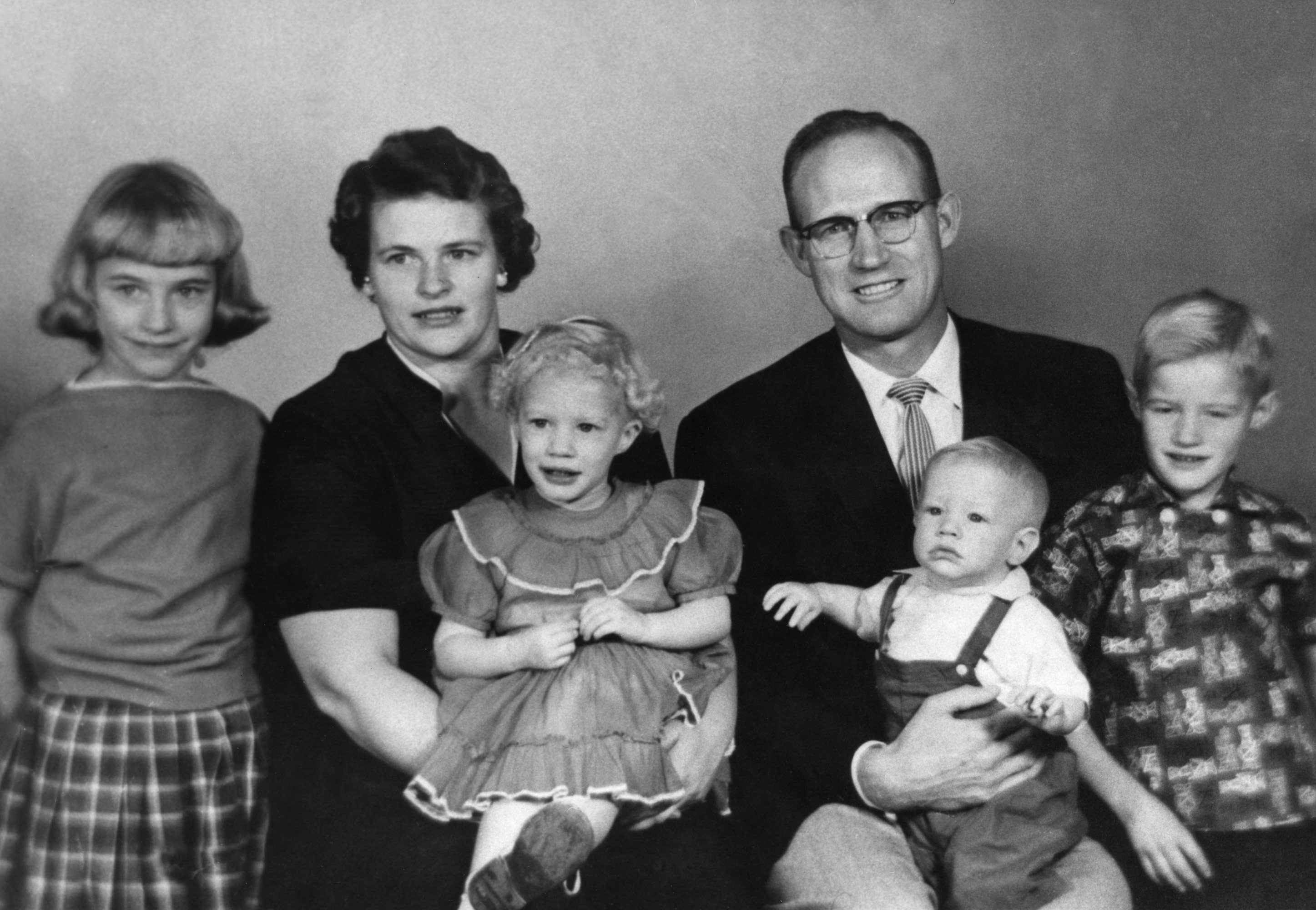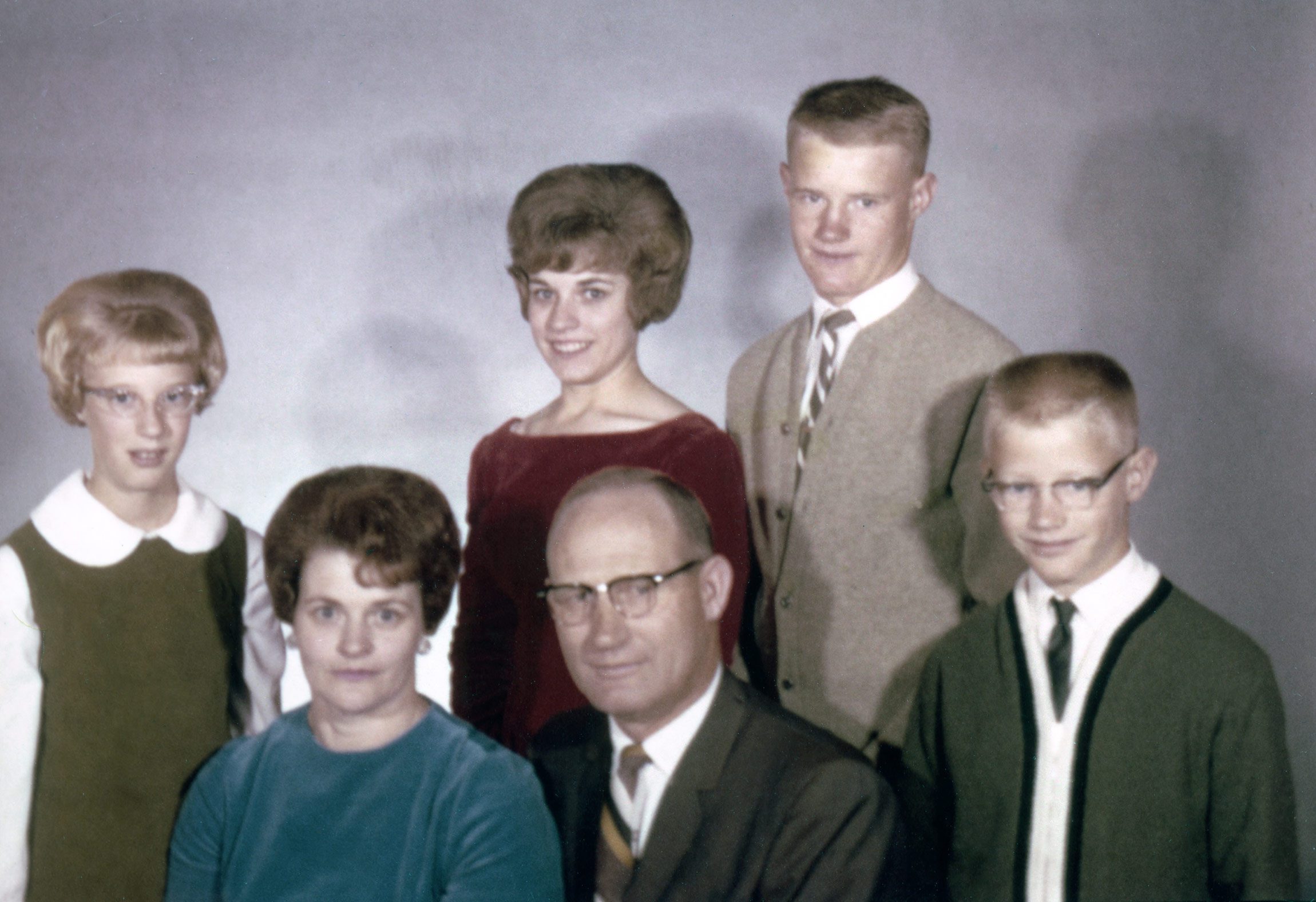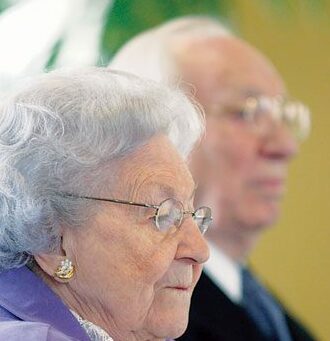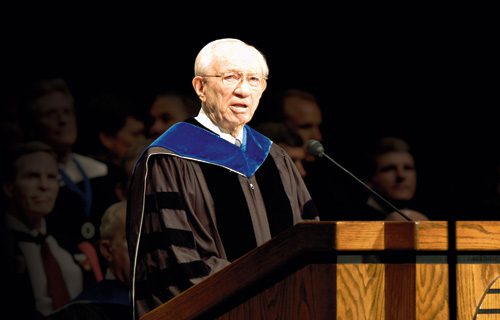Meet the Worthens
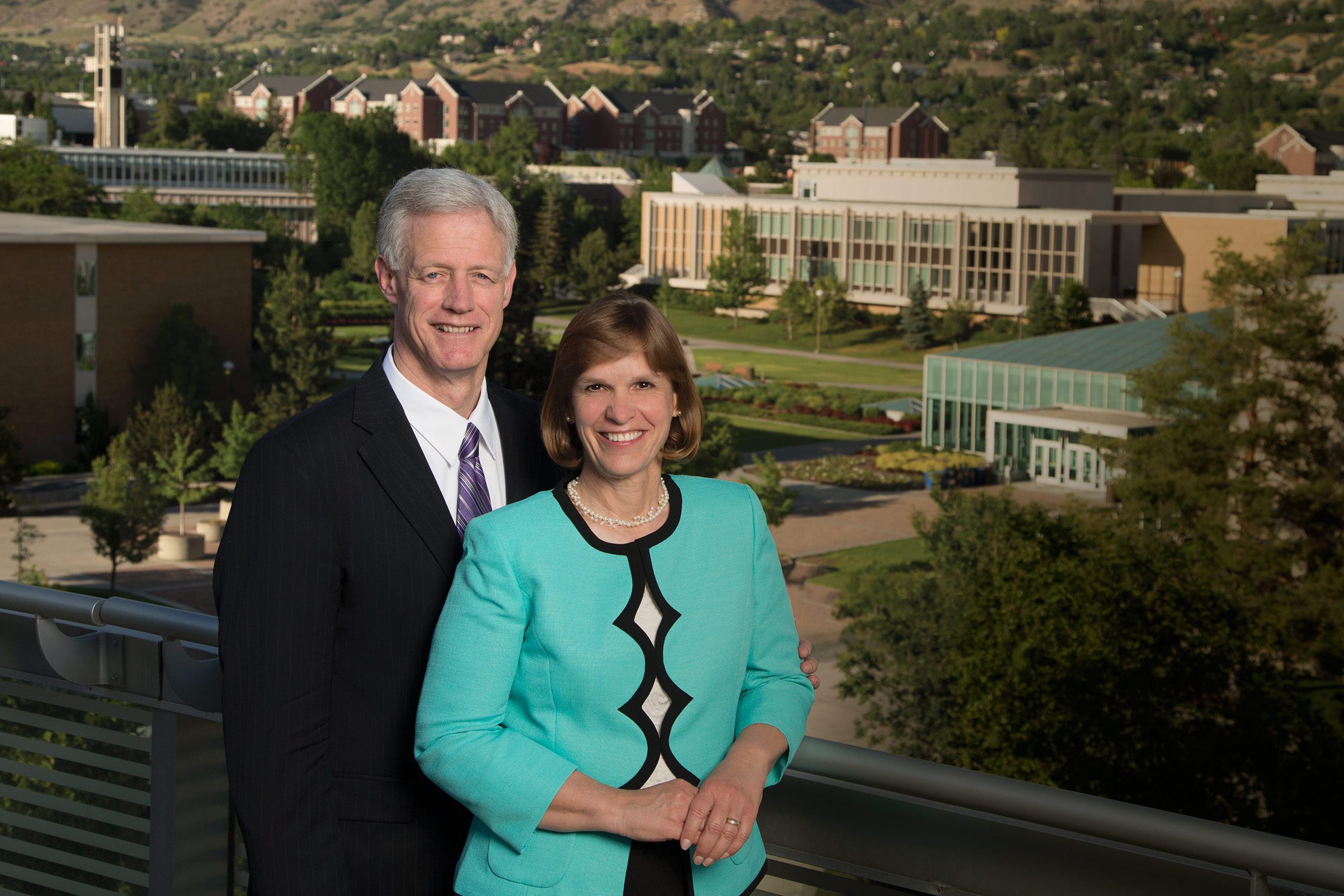
Meet the Worthens
With small-town roots and a passion for the mission of Brigham Young University, Kevin J Worthen takes the reins as the university’s 13th president.
By Peter B. Gardner (BA ’98, MA ’04) in the Summer 2014 Issue
“It was all brass and glass and oak,” recalls Bradley L. King (BS ’80, MEd ’84) of his 1987 visit to the Phoenix law office of Kevin J Worthen (BA ’79, JD ’82), a childhood buddy. Fresh off a clerkship with U.S. Supreme Court justice Byron White, Worthen seemed to be on the fast track to a partner’s role with the respected firm Jennings Strouss & Salmon, an enviable situation for any young attorney. “This is wonderful,” King remembers thinking, “but it doesn’t seem to fit him exactly.” So he wasn’t surprised when Worthen called soon after to say he was considering an offer to return to the BYU Law School as a faculty member. When King questioned whether his friend was ready to step away just three years into a corporate law career, Worthen said he’d have to think it over carefully. “And he did,” says King, “for about three or four seconds.”
ENTICING AS THE PROSPECTS WERE FOR KEVIN WORTHEN AND HIS WIFE, PEGGY SEALEY WORTHEN (BA ’03), THEY COULDN’T COMPETE WITH KEVIN’S LOVE OF LEARNING, RESEARCH, AND—PERHAPS MOST OF ALL—BYU ITSELF.
Though no one could have predicted it at the time, that abrupt veering from the obvious career path set the Worthens on a new course—a trajectory that led to Kevin’s March 2014 appointment as the 13th president of Brigham Young University.
Carbon County Kid
By all accounts, young Kevin Worthen should have been an Aggies fan. His dad, an educator, had gone to Utah State; so had Kevin’s uncles, one of whom played basketball for the Aggies. Except for the Church angle, Kevin had no connections to BYU.
And yet, “from the time I was a little kid, for reasons I’m not entirely sure of,” says Worthen, “I’ve been a BYU fan.”
Worthen was born in Dragerton, Utah, a tiny Carbon County town that no longer exists. When he was 5, his family moved 20 miles west to Price—a beautiful place, says Worthen, “as long as your definition of beauty doesn’t include green.” What the mining town had was an abundance of dirt, hills, and reptiles, which, in the language of a young boy, roughly translates to fun.
But amid the play, precocious Kevin was already showing signs of intellectual gifts. When a sister, one year older, came home from first grade with a book, it was Kevin who read it first. When Kevin himself was a first grader, classmates at school would gather around to hear him read chapter books.
Friends became used to quiet, reserved Kevin being at the top of the class. “I wondered how he would ever make up his mind what to go into,” says King, “because he was one terrific math student—and science and English and everything else too.”
That choice was made easier by brother Clyde F. Worthen (BA ’74, JD ’77), six years Kevin’s senior and a basketball and football player at Carbon High. “Whatever [Clyde] did, I wanted to do,” remembers Kevin. So when Clyde decided to attend BYU’s newly formed J. Reuben Clark Law School, high school junior Kevin declared, “‘I’m going to law school.’ I gave it no more thought than that.”
Clyde says that unassuming brilliance would continue to characterize his brother years later in law school. “One professor told [me] how Kevin never raised his hand to answer any questions, but when called on, he always had the right answer.”
“From the time I was a little kid, for reasons I’m not entirely sure of, I’ve been A BYU FAN.” —Kevin Worthen
Back in high school, Kevin’s interests encompassed just about every opportunity Price offered: he was on the debate team, wrote for the school newspaper, sang in the choir, and played cornet in the band. But more than anything, his teen years were defined by sports—especially basketball.
On the short side as a freshman, Kevin played guard until a growth spurt eventually repositioned him under the hoop. With a center’s frame and a guard’s handle, Kevin was all-state as a senior.
Worthen has been a lifelong student of the sport—and a regular at BYU games. He still clearly remembers entering a packed Smith Fieldhouse as a 10-year-old to attend his first BYU basketball game, which featured a Cougar squad that would go on to win the National Invitational Tournament. “I had died and gone to heaven. I couldn’t imagine anything more fun,” he says. “From then on, coming to BYU was like being at Disneyland. It didn’t matter why I came to BYU. If I could just be on campus, it was the greatest thing ever.”
But when it came time to go to college, Kevin had to choose between a full-ride academic scholarship to the Y and a chance to extend his basketball career two more years. Basketball won out, and Worthen enrolled at the College of Eastern Utah (CEU) in Price.
BYU would have to wait.
The Girl Down the Hill
Hello, Peggy?” ventured a tremulous voice over the phone line. “This is Kevin Worthen. You may not know me.” It had been less than a month since he’d returned from a mission to Monterrey, Mexico. At a church dance, he’d spotted Peggy—that younger girl who lived three and a half blocks down the hill, now all grown up. Afterward he got the inside scoop on her from a mutual friend, who promptly spilled the beans to Peggy.
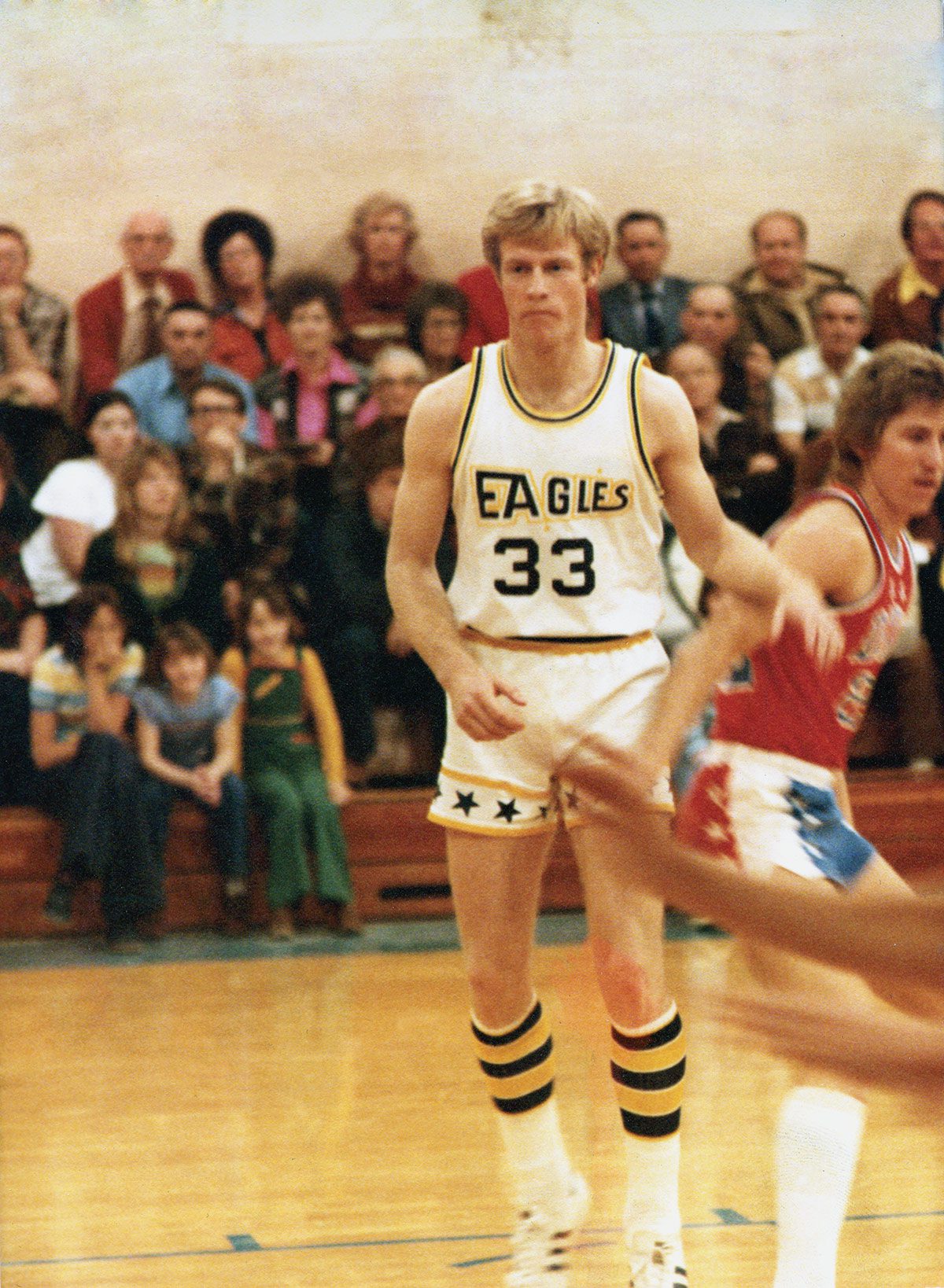
“Yeah, I think I know who you are,” said Peggy, who’d had a crush on Kevin for years. She had picked up on his attention at the dance, and the friend had confirmed it. But then no call from Kevin. “It was four days later,” she says. “I was absolutely annoyed.” So when he stammered that a few friends were headed up north for a day at Lagoon and would she like to go, she didn’t go easy on him: “Well, I’ll have to ask my mother.”
Despite that uncertain start, the day at Lagoon went well, though Peggy showed up basketball star Kevin at the free-throw-shooting contest. “I thought I’d impress her,” he says, “and she’s the one who wins the stuffed animal”—a triumph she hasn’t let him forget during three decades of marriage.
They courted while Peggy, not then a member of The Church of Jesus Christ of Latter-day Saints, took the missionary lessons and Kevin finished his associate’s degree as a covaledictorian at CEU while working summers in a coal mine. By the time he departed for BYU in the fall of 1978, they were engaged to be married.
More studious than ever, Kevin wrapped up his undergraduate degree in political science in just a year and started in on a law degree at the J. Reuben Clark Law School. Despite his single-minded scholarly drive, he still found time to win two intramural basketball championships (once with the Flying Burrito Brothers)—which he calls the apex of his athletic achievement.
After marrying in the Provo Temple, Kevin and Peggy moved into a trailer home in south Provo. King remembers dropping by one day to find Kevin immersed in his studies at the kitchen table. Where was Peggy? She was busy fixing the plumbing. King says that Peggy, raised by a jack-of-all-trades father, “can do about anything; she’s very talented.”
Over the years Peggy has taken on everything from gardening, cake decorating, and sewing (she was hard at work on their daughter’s wedding dress when Kevin was announced as president) to playing the piano, hiking, and fulfilling numerous Church assignments, including serving for many years as a Young Women camp leader.
Aaron M. Worthen (BA ’11, JD ’14), the second of the Worthens’ three children, remembers one family vacation when he was about 10. “My siblings and I were trying to do perfect-10 dives into the hotel swimming pool. After a few belly flops from the three of us,” Aaron recalls, his mom had seen enough. She strode to the pool’s edge and—fully clothed—showed them how it’s done.
“Peggy is full of life and energy—quick to laugh,” says James R. Rasband (BA ’86), dean of the BYU Law School. His wife, Mary Williams Rasband (BS ’85, MS ’88), adds that Peggy “has a fantastic sense of humor, . . . the product of the right kind of perspective.” While Peggy had taken some courses at CEU, she had set studies aside as Kevin finished school and the young family traveled to Washington, D.C., where Kevin clerked for Judge Malcolm Wilkey on the D.C. Circuit Court and then for Justice Byron White on the Supreme Court. Meanwhile Peggy worked various jobs, including a stint in Utah senator Jake Garn’s office.
After they returned to Provo and got caught up in the business of rearing children, says Peggy, “I’d always get a little heartbroken when I’d see people getting their [graduation] picture taken by the cougar. . . . I’d think, ‘That’s what I want to do.’”
So when their youngest started kindergarten, Peggy returned to school to pursue a degree in English. The journey would take eight years and end with an epic struggle with her nemesis, College Algebra. “It’s a course well known in our home,” says Kevin. “Everyone was helping.”
When Peggy finally donned cap and gown, the family filled up a roll’s worth of pictures by the cougar.
Planting Seeds, Plucking Fruit
Carl Hernandez III. Kevin Worthen read the name on a list of several new law students who were to attend a first-week reception at his home. The first thought that came to the new law professor—and later the basis for an ongoing joke—was that this kid probably grew up in Beverly Hills, a silver spoon in his mouth—someone a guy from Carbon County could never relate to.
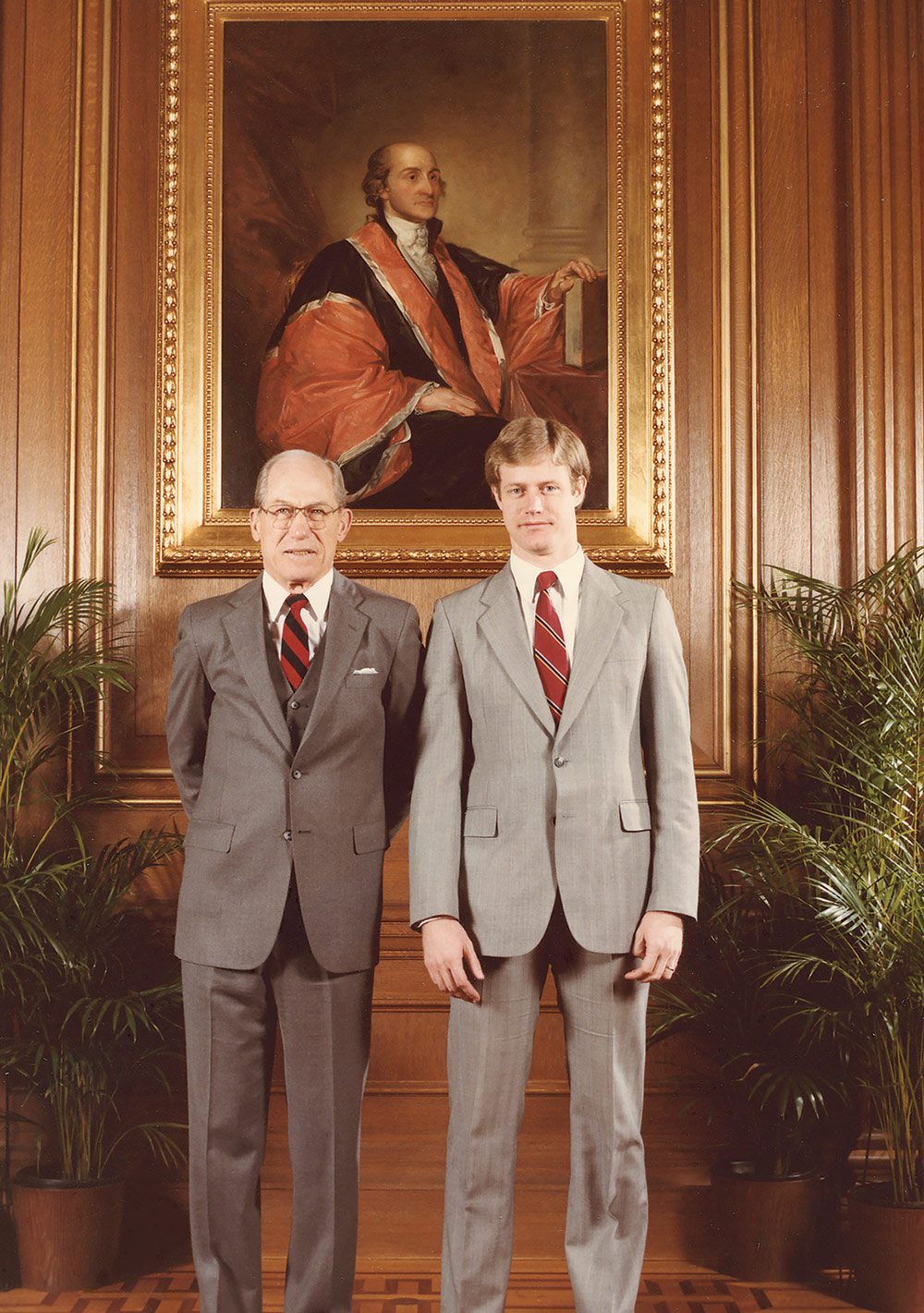
That notion was dispelled as soon as the Worthens met the actual Carl Hernandez III (BA ’88, JD ’92, MPA ’92). Hernandez, it turned out, had grown up in a family of migrant laborers, picking olives, oranges, apples, pears, walnuts—whatever needed harvesting in California’s Central Valley. They had found the gospel when Hernandez was 14. As a reminder of where he came from, Hernandez, now a BYU law professor, keeps on his office shelf a jar of the chalk nubs his grandfather had used to mark his employee number on produce crates.
Something in Hernandez’s story, says Worthen, caused him inwardly to say, “Oh, that’s me.” This was someone a guy from Price could relate to—and someone he could help.Worthen soon invited Hernandez to work as a teaching assistant and join him in his research of federal Indian law. And while still a student, Hernandez served as a counselor to Worthen in a student-ward bishopric. “I count him as one of the greatest mentors I’ve ever had,” says Hernandez.
After practicing law in California, Hernandez returned to the Law School as the dean of admissions. In that role, he and Worthen took interest in another unlikely law candidate, a former BYU running back who had left school without a degree in 1996. “Football was my passion,” says Mark Atuaia (JD ’11, MPA ’11). “School was a necessary evil.”
After floundering for several years, and with the stern encouragement of his father, Atuaia returned to school—at BYU–Hawaii, where he got serious about academics and later caught the attention of Hernandez on a recruiting trip. Hernandez passed the word on to Worthen, by then dean of the law school, who met Atuaia on another trip to the islands. Atuaia still remembers what Worthen told him: “Mark, by us taking a chance on you—trust me, it is a far stretch—we want you to . . . help build Zion. Will you commit to that?” Understanding the expectation, Atuaia signed up.
“One cannot look toward the future of Brigham Young University without becoming ENTHUSIASTIC.” —Kevin Worthen
Atuaia’s impression of Worthen was cemented when the dean visited the simple Army surplus home in Laie where Atuaia had grown up. How would Dean Worthen—who had met with dignitaries and major donors—relate to his aging parents in their humble dwelling? Something in Worthen’s demeanor and words that day struck Atuaia: “He was just as comfortable. He was just as genuine. . . . For me, that’s when it all hit home: . . . ‘I can really trust this dude.’”“There are no judgments about anybody or anything,” says Atuaia. “He just accepts you for who you are and helps elevate you. That’s a Christlike quality.”
With the encouragement of Worthen and Hernandez, Atuaia later tacked an MPA onto his JD—all to increase his ability to build the kingdom. Now a BYU assistant football coach, Atuaia says his education and skills make him a role model and mentor for young Polynesian recruits.
Worthen, Hernandez, and Atuaia form an unusual trio—almost the set-up for a joke: What do you get if you bring together a tall white guy, a short Latino, and a burly Polynesian? Brothers, says Atuaia.From the Hernandezes’ Christmastime tamale parties to attendance at baby blessings and weddings, their connection extends far beyond a working relationship. When Worthen was called as an Area Seventy in 2010, his unannounced appearances at Atuaia family baby blessings and baptisms caused consternation for the local leadership. “They go, ‘You need to let us know,’” says Atuaia. “I’m like, ‘That’s my brother, man. If he comes, he comes.’”
Worthen says the BYU community can expect to hear a lot from him about mentoring—in large measure because of the role mentors have played in his own life. Worthen can trace one strand of his mentoring lineage back to Karl G. Maeser—via Cecil O. Samuelson, Neal A. Maxwell, Marion G. Romney, J. Reuben Clark, and James E. Talmage (BD 1881).
Another important mentor was Rex E. Lee (BA ’60), who was Worthen’s law school dean before leaving to become the U.S. solicitor general. “He had the ability to make you feel like you were the most important person in the world,” says Worthen. Lee would later help Worthen land his clerkships with Judge Wilkey and, more directly, with Justice Byron White, for whom Lee himself had clerked. Worthen says Lee’s recommendation “made a huge difference.”
Hernandez says the Worthens, with their small-town upbringing, have a special appreciation for the underdog, for those whom others might overlook. “They have the . . . ability to help people feel that they have something to offer this world.”
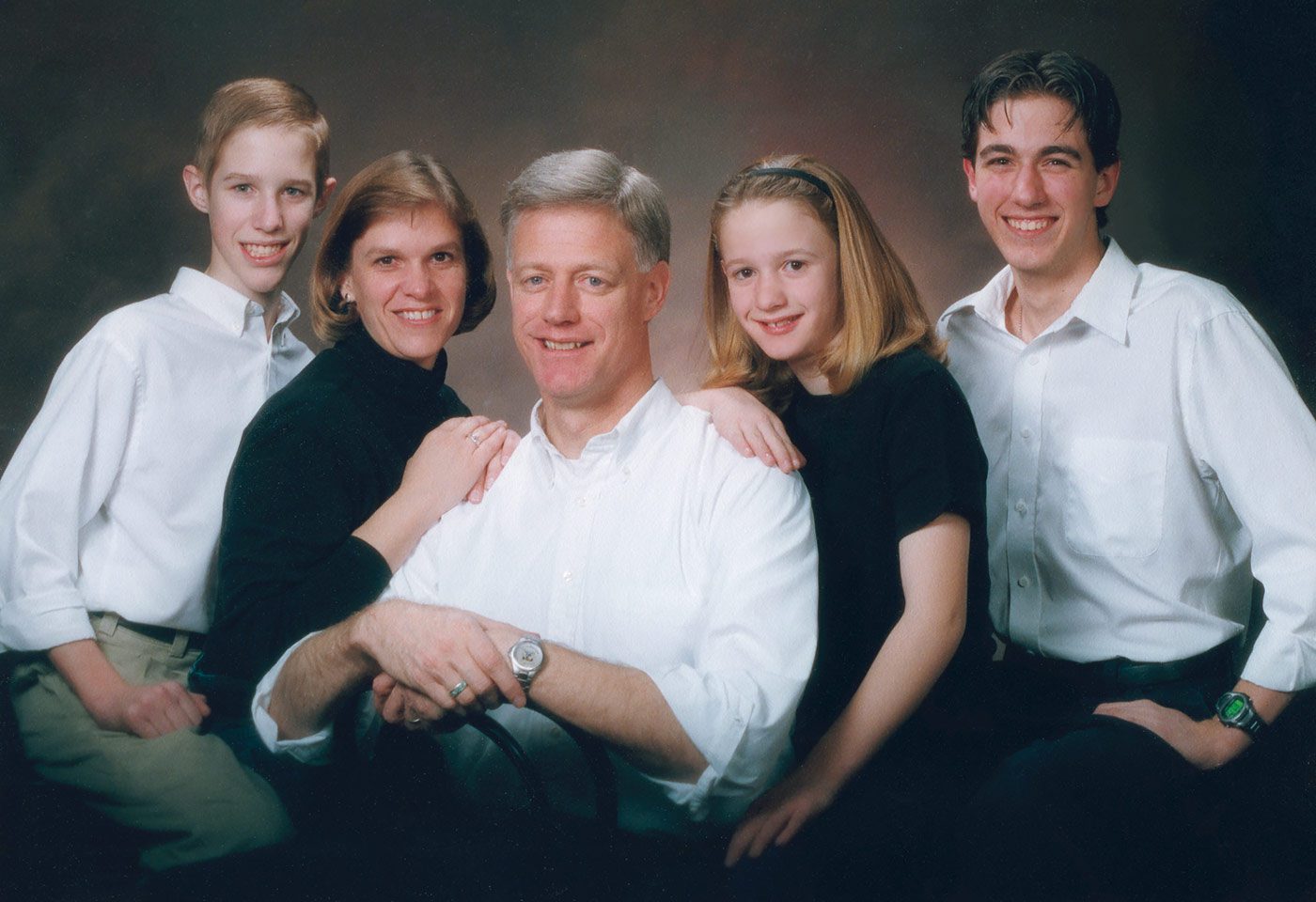
Building on the Foundation
In Worthen’s rise in authority at BYU, observers say he’s remained his same humble self. But there has been one notable change, says Rasband, Worthen’s successor as Law School dean: “His ability to comment on sports officiating has been in steady decline. As he has moved from faculty member to dean to advancement vice president to president, he’s lost a bit of his vocal chords.”
Athletics director Thomas A. Holmoe (BS ’83, MS ’95) agrees that this transition will be tough for the ultimate BYU fan: “It’ll be interesting to see if he’ll be able to remain calmly seated. We might have to put a seatbelt on him.”In anticipating what a Kevin Worthen presidency might look like, colleagues say it’s instructive to look back at how he filled his last two posts as dean of the Law School and then as advancement vice president, where he oversaw such areas as BYUtv, athletics, alumni, fundraising, and communications.
When he was first appointed dean of the Law School in 2004, Worthen approached his work just as you might expect a former U.S. Supreme Court clerk to do—he went to the library to see what the governing law had to say on the matter. In this case, “the law” was the mission and aims of the university and several key addresses by the school’s founding figures—President Marion G. Romney and Dallin H. Oaks (BS ’54), who was then BYU president.
Rasband says Dean Worthen was first “focused on principles, not application. . . . Once the foundational principles were in place, he relied on individuals to be creative within the framework of those principles.”When Worthen was named advancement vice president in 2008, his legal background was just what was needed as BYU joined a new athletic conference, went independent in football, and negotiated TV rights. Yet he is quick to deflect credit to those above and below him for any successes.
Tanise McIntire Chung-Hoon (BS ’89, PhD ’05), managing director of LDS Philanthropies, says Worthen “doesn’t think he has all the answers and is really excited to gather people of expertise and capacity around him. . . . He says, ‘This is your stewardship. How can I help you be successful?’”
Chung-Hoon says that nobody who had worked with Worthen in his previous roles was “surprised one whit when he was named [president], because we’ve all felt like, if we had to choose somebody, Kevin Worthen would be our recommendation.”
For his part, Worthen didn’t see it coming. When he was invited to meet with President Henry B. Eyring early this year, he imagined all sorts of possible reasons—but not this. He admits feeling overwhelmed by the prospect of leading an institution that had meant so much to him.
Over the ensuing weeks strength and direction came as he turned once more to founding documents and governing principles. Core to these are BYU’s mission to “assist individuals in their quest for perfection and eternal life” and its commitment to providing a spiritually strengthening, intellectually enlarging environment.
Whatever trepidation he may have felt at his appointment, in an April address Worthen echoed the hopeful words of an earlier BYU president, Franklin S. Harris (BS 1907): “One cannot look toward the future of Brigham Young University without becoming enthusiastic.”
“There is a divine destiny at this school,” Worthen declared, “and it [plays] out largely in the lives of our graduates and the influence that they have. . . . To be part of an organization that has that kind of impact—an eternal impact on people’s lives—it’s a tremendous experience.”


